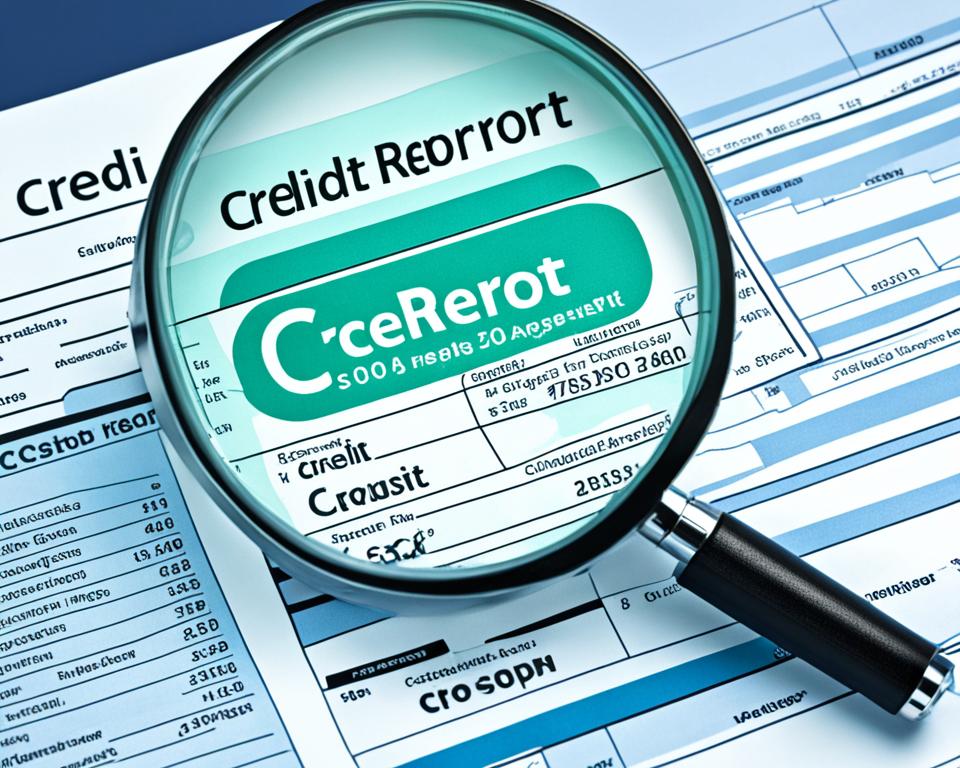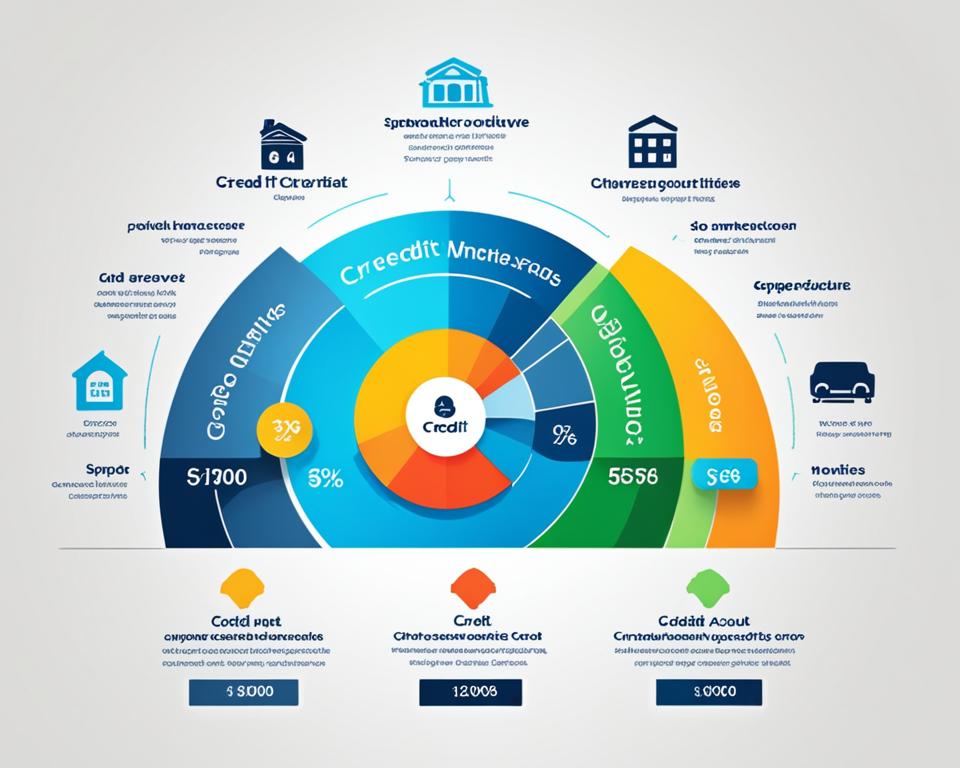Are you looking for an effective credit repair tip that can help improve your credit score? One important step to consider is disputing inaccuracies on your credit report. Your credit report plays a crucial role in determining your creditworthiness, and it’s essential to ensure that it accurately reflects your financial history.
Errors on your credit report can negatively impact your credit score, making it difficult to obtain loans or favorable interest rates. By disputing inaccuracies, you have the opportunity to rectify any mistakes and potentially raise your credit score.
But what exactly are credit report inaccuracies? How can you check your credit report for errors? And what is the credit dispute process? In this article, we’ll explore everything you need to know about disputing inaccuracies on your credit report.
Key Takeaways:
- Disputing inaccuracies on your credit report is a crucial credit repair tip.
- Inaccurate information on your credit report can harm your credit score and financial well-being.
- Regularly checking your credit report is crucial to identify errors that need to be disputed.
- Identify common credit report inaccuracies, such as incorrect personal information or erroneous account details.
- Understand the credit dispute process and follow step-by-step guidelines to resolve inaccuracies.
Understanding credit report inaccuracies
When it comes to maintaining a healthy credit score, it’s crucial to have an accurate and error-free credit report. Unfortunately, credit report errors are more common than you might think. These inaccuracies can have a significant impact on your credit score and your overall financial well-being. To fix credit score and protect your financial standing, it’s essential to understand the credit dispute process and take action to correct any errors.
Common credit report errors can include incorrect personal information, such as misspellings of your name or an outdated address. These seemingly minor errors may seem harmless, but they can create confusion and potentially lead to more severe issues when creditors review your credit history. Additionally, inaccurately reported accounts, such as accounts that don’t belong to you or accounts incorrectly marked as delinquent, can negatively affect your creditworthiness.
It’s crucial to identify these credit report errors quickly and take the necessary steps to dispute them. By doing so, you can protect your credit score and ensure that your financial history is accurately reflected in your credit report.
The credit dispute process involves contacting the credit bureaus to notify them of the errors and requesting an investigation. This process allows you to challenge any information you believe to be inaccurate or incomplete. It’s important to gather any supporting documentation, such as bank statements or payment records, to support your dispute.
Remember: The burden of proof lies with the credit bureaus and the data furnishers, so it’s crucial to provide evidence that supports your claims. Be sure to keep copies of all correspondence and documentation for your records.
The credit bureaus are required by law to investigate your dispute within 30 days of receiving it. Once the investigation is complete, they must inform you of the results and any changes made to your credit report. If the inaccurate information is removed or corrected, it can improve your credit score and open doors to better financial opportunities.
Understanding credit report inaccuracies and knowing how to navigate the credit dispute process is essential for anyone looking to fix credit score and maintain a healthy financial future. By regularly reviewing your credit report and taking action to correct any errors, you can ensure that your credit history accurately represents your financial behavior and increase your chances of qualifying for favorable interest rates on loans, credit cards, and more.
Key Takeaways:
- Common credit report errors can include incorrect personal information and inaccurately reported accounts.
- It’s crucial to identify and dispute credit report errors promptly to protect your credit score and financial well-being.
- The credit dispute process involves contacting the credit bureaus, providing supporting documentation, and requesting an investigation.
- Understanding credit report inaccuracies and taking steps to correct them can improve your credit score and increase your access to better financial opportunities.
How to check your credit report
Obtaining a copy of your credit report is an essential step in understanding and managing your financial health. By reviewing your credit report from major credit bureaus, you can identify any inaccuracies that may be negatively affecting your credit score.
To check your credit report, follow these steps:
- Request a copy: Contact the three major credit bureaus – Experian, Equifax, and TransUnion – either online or by mail to request a free copy of your credit report. You are entitled to one free credit report per year from each bureau. Alternatively, you can use a trusted credit monitoring service to access your report.
- Review the report: Once you receive your credit report, carefully review all the information provided. Pay close attention to personal details, such as your name, address, and social security number, to ensure accuracy.
- Check account information: Examine the account details, including credit cards, loans, and mortgages, to ensure that they are correctly reported. Look for any accounts you don’t recognize or any inaccurately reported balances or payment history.
- Identify errors or discrepancies: If you come across any credit report errors, such as incorrect personal information, duplicate accounts, or unauthorized inquiries, make a note of them. These errors could be impacting your credit score and should be disputed.
- Dispute inaccuracies: If you find any inaccuracies or discrepancies on your credit report, it’s crucial to take immediate action. Contact the credit bureau(s) in writing, providing them with a detailed explanation and supporting documents to back up your claims. They are required to investigate the disputed information within 30 days and correct any errors.
Remember, checking your credit report regularly is essential for maintaining a healthy credit score and financial well-being. By identifying and disputing credit report errors, you can take control of your credit and work towards improving your credit score.
By following these steps and staying vigilant about your credit report, you can ensure that your financial history is accurately reflected and take the necessary steps to fix any credit report errors that may be negatively affecting your credit score.
Identifying inaccuracies on your credit report
When it comes to your credit report, accuracy is crucial. Even a minor error can have a significant impact on your credit score and financial well-being. In this section, we will provide you with tips and examples on how to identify common inaccuracies on your credit report so that you can take the necessary steps to correct them.
“A credit report is like a financial passport, and it’s important to make sure that it reflects your true credit history.”
Discrepancies in Personal Information
One of the first things you should review on your credit report is your personal information. Look for any misspellings, outdated addresses, or incorrect social security numbers. These errors may seem minor, but they could indicate potential identity theft or mixed credit files.
Erroneous Account Information
Next, analyze the account information section of your credit report. Check if all the accounts listed belong to you. Look for any accounts that you have closed but are still reported as open. Additionally, examine the account balances and credit limits. If you notice any discrepancies, such as inflated balances or inaccurate credit limits, it’s crucial to dispute them.
Incorrect Negative Marks
Negative marks on your credit report, such as late payments, collections, or bankruptcies, can significantly impact your credit score. Carefully review these negative marks to ensure their accuracy. Look for any incorrect dates, duplicate entries, or negative marks that should have been removed because they reached their expiration date.
By diligently examining your credit report for inaccuracies in personal information, account details, and negative marks, you can identify errors that may be dragging down your credit score. Armed with this knowledge, you can proceed to the credit dispute process to rectify these inaccuracies and improve your credit standing.

| Error Type | Examples |
|---|---|
| Discrepancies in Personal Information | Misspelled name, incorrect address, outdated phone number |
| Erroneous Account Information | Closed accounts reported as open, inaccurate account balances |
| Incorrect Negative Marks | Incorrect dates, duplicate entries, expired negative marks still reported |
The credit dispute process
Disputing inaccuracies on your credit report is a crucial step towards improving your financial standing. By following the credit dispute process, you can ensure that your credit report accurately reflects your financial history. This section will provide you with a step-by-step guide on how to effectively dispute inaccuracies and rectify your credit report.
- Gather supporting documentation: Start by collecting any relevant evidence that supports your claim of inaccuracies on your credit report. This can include credit card statements, payment receipts, or correspondence with creditors.
- Draft dispute letters: Once you have gathered your supporting documentation, it’s time to craft your dispute letters. These letters should clearly outline the inaccuracies on your credit report and provide the necessary evidence to support your claim. Make sure to address the credit bureaus and include details such as your full name, address, and Social Security number.
- Submit letters to the credit bureaus: After drafting your dispute letters, send them to the three major credit bureaus: Equifax, Experian, and TransUnion. It’s recommended to send the letters via certified mail with a return receipt to ensure proof of delivery.
- Follow up on the progress: Keep track of your dispute process by monitoring your credit report and maintaining communication with the credit bureaus. It usually takes around 30 to 45 days for the credit bureaus to investigate your dispute and provide a response.
Remember to keep copies of all correspondence, including your dispute letters and any responses from the credit bureaus. If the credit bureaus fail to correct the inaccuracies or fail to respond within the given timeframe, you may need to seek legal assistance or file a complaint with the Consumer Financial Protection Bureau (CFPB).
Disputing inaccuracies on your credit report might initially seem daunting, but by following the credit dispute process, you can take control of your financial reputation. It’s an essential step towards improving your credit score and ensuring that your credit report accurately represents your financial history.
Key Points to Remember for the Credit Dispute Process
| Steps | Actions |
|---|---|
| Gather supporting documentation | Collect evidence that supports your claim of inaccuracies on your credit report |
| Draft dispute letters | Create well-written letters addressing the inaccuracies and provide supporting evidence |
| Submit letters to the credit bureaus | Send your dispute letters via certified mail to Equifax, Experian, and TransUnion |
| Follow up on the progress | Monitor your credit report and maintain communication with the credit bureaus |
Tips to improve your credit score
Improving your credit score requires more than just disputing inaccuracies on your credit report. By implementing these additional tips, you can take proactive steps towards fixing your credit score and achieving better financial stability.
Paying Bills on Time
One of the most effective ways to improve your credit score is by consistently paying your bills on time. Late payments can have a detrimental impact on your creditworthiness. Set up automatic payments or reminders to ensure that your bills are promptly paid each month. This responsible financial behavior will demonstrate your reliability to lenders and help boost your credit score.
Reducing Credit Utilization
Another crucial aspect of improving your credit score is to keep your credit utilization ratio low. This ratio represents the amount of credit you are currently using compared to your total available credit limit. Aim to keep your credit utilization below 30% to show lenders that you are not overly reliant on credit. Paying off outstanding balances and reducing your credit card debt can significantly improve your credit score over time.
Building a Positive Credit History
A positive credit history is a key factor in determining your creditworthiness. To improve your credit score, focus on building a solid credit history by using credit responsibly. Make small purchases on your credit card and pay them off in full each month to establish a positive payment history. Avoid closing old credit accounts, as they contribute to the overall length of your credit history. By demonstrating responsible credit usage over time, you can enhance your creditworthiness and improve your credit score.
“Improving your credit score requires consistency, responsible financial behavior, and patience. By paying your bills on time, keeping your credit utilization low, and building a positive credit history, you can take control of your creditworthiness and achieve your financial goals.”
| Tip | Description |
|---|---|
| Paying Bills on Time | Consistently pay your bills on time to demonstrate reliability. |
| Reducing Credit Utilization | Keep your credit utilization ratio below 30% by paying off debt. |
| Building a Positive Credit History | Establish a solid credit history by using credit responsibly. |
Conclusion
In conclusion, disputing inaccuracies on your credit report is a vital credit repair tip that can have a significant impact on your overall financial well-being. By addressing and rectifying errors, you not only improve your credit score but also ensure that your credit report accurately reflects your financial history.
Identifying credit report errors and going through the dispute process may seem daunting, but it is a necessary step to take control of your creditworthiness. Through careful review and gathering of supporting documentation, you can challenge inaccuracies and have them corrected by the credit bureaus.
Remember, improving your credit score goes beyond disputing inaccuracies. It is crucial to establish healthy financial habits, such as paying bills on time, reducing credit utilization, and building a positive credit history. By combining these strategies with disputing credit report errors, you can optimize your creditworthiness and pave the way for better financial opportunities.
FAQ
How can disputing inaccuracies on my credit report help improve my credit score?
Disputing inaccuracies on your credit report is essential for improving your credit score. Errors and inaccuracies on your report can lower your credit score by falsely portraying your creditworthiness to lenders. By disputing these inaccuracies and having them removed from your report, you can ensure that your credit score accurately reflects your financial history.
What are some common credit report errors that I should look out for?
When reviewing your credit report, you should look out for common errors such as incorrect personal information, outdated or closed accounts still listed as open, fraudulent accounts, inaccurate payment history, and incorrect balances or credit limits. These errors can negatively impact your credit score and should be disputed.
How can I check my credit report?
You can obtain a free copy of your credit report from each of the major credit bureaus – Equifax, Experian, and TransUnion – once a year by visiting AnnualCreditReport.com. It is important to review all three reports as they may contain different information. Alternatively, you can request a copy from each bureau directly.
What should I do if I find inaccuracies on my credit report?
If you find inaccuracies on your credit report, you should take immediate steps to dispute them. Start by gathering supporting documentation that proves the inaccuracies. Then, draft a dispute letter detailing the errors and providing the necessary evidence. Send the letter and supporting documentation to each credit bureau reporting the inaccuracies and keep copies for your records.
What is the credit dispute process?
The credit dispute process involves submitting your dispute letter with supporting documentation to the credit bureaus. Once they receive your dispute, they have 30 days to investigate the accuracy of the disputed information. The credit bureaus will reach out to the relevant creditor or information provider to verify the accuracy of the information. If the information is found to be inaccurate, it will be removed or corrected on your credit report.
Apart from disputing inaccuracies, what are some other tips to improve my credit score?
In addition to disputing inaccuracies on your credit report, there are several other strategies to improve your credit score. These include making all bill payments on time, keeping credit card balances low, avoiding new credit applications unless necessary, and maintaining a diverse mix of credit types. Building a positive credit history over time will also help improve your credit score.





